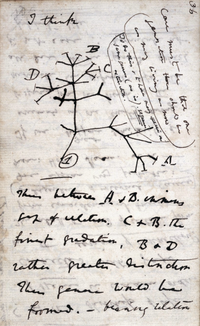
Photo from wikipedia
Significance Bacteria secrete many molecules outside the cell, where they provide benefits to other cells. One potential reason for producing these “public goods” is that they benefit closely related cells… Click to show full abstract
Significance Bacteria secrete many molecules outside the cell, where they provide benefits to other cells. One potential reason for producing these “public goods” is that they benefit closely related cells that share the gene for cooperation (kin selection). While many laboratory studies have supported this hypothesis, there is a lack of evidence that kin selection favors cooperation in natural populations. We examined bacterial genomes from the environment and used population genetics theory to analyze the DNA sequences. Our analyses suggest that public goods cooperation has indeed been favored by kin selection in natural populations.
Journal Title: Proceedings of the National Academy of Sciences of the United States of America
Year Published: 2022
Link to full text (if available)
Share on Social Media: Sign Up to like & get
recommendations!